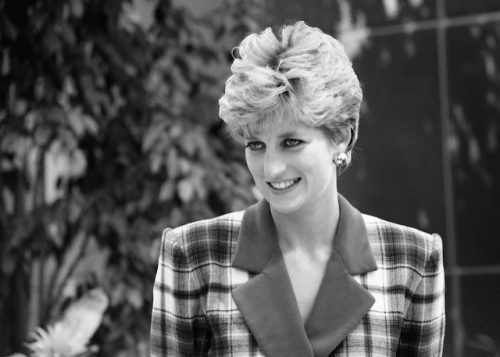
(Photo credit: Paisley Scotland)
This year marks the 20th anniversary of the death of Princess Diana. She remains a vivid icon, remembered for her charisma, grace and tireless activism. Now, thanks to footage and transcripts from a 1995 interview with BBC1 Panorama’s Martin Bashir, we see another facet of the late princess—her courage to talk about things no one else was talking about.
In the interview, Diana spoke candidly about her experience with postpartum depression and self-injury. She was honest and reflective, and even though us commoners can’t fathom the unique pressures of royal living, her struggles as a new mom are surprisingly relatable.
Here’s what we learned from their conversation.
Diana had PPD with her son William, but didn’t know it until later.
BASHIR: How did the rest of the Royal Family react when they learnt that the child that you were to have was going to be a boy?
DIANA: Well, everybody was thrilled to bits. It had been quite a difficult pregnancy – I hadn’t been very well throughout it – so by the time William arrived it was a great relief because it was all peaceful again, and I was well for a time.
Then I was unwell with post-natal depression, which no one ever discusses, post-natal depression, you have to read about it afterwards, and that in itself was a bit of a difficult time. You’d wake up in the morning feeling you didn’t want to get out of bed, you felt misunderstood, and just very, very low in yourself.
BASHIR: Was this completely out of character for you?
DIANA: Yes, very much so. I never had had a depression in my life.
But then when I analysed it I could see that the changes I’d made in the last year had all caught up with me, and my body had said: `We want a rest.’
She received treatment, but lacked community support.
BASHIR: So what treatment did you actually receive?
DIANA: I received a great deal of treatment, but I knew in myself that actually what I needed was space and time to adapt to all the different roles that had come my way. I knew I could do it, but I needed people to be patient and give me the space to do it.
BASHIR: When you say all of the different roles that had come your way, what do you mean?
DIANA: Well, it was a very short space of time: in the space of a year my whole life had changed, turned upside down, and it had its wonderful moments, but it also had challenging moments. And I could see where the rough edges needed to be smoothed.
BASHIR: What was the family’s reaction to your post-natal depression?
DIANA: Well maybe I was the first person ever to be in this family who ever had a depression or was ever openly tearful. And obviously that was daunting, because if you’ve never seen it before how do you support it?
BASHIR: What effect did the depression have on your marriage?
DIANA: Well, it gave everybody a wonderful new label – Diana’s unstable and Diana’s mentally unbalanced. And unfortunately that seems to have stuck on and off over the years.
BASHIR: Are you saying that that label stuck within your marriage?
DIANA: I think people used it and it stuck, yes.
It became so painful that she would self-injure.
BASHIR: According to press reports, it was suggested that it was around this time things became so difficult that you actually tried to injure yourself.
DIANA: Mmm. When no one listens to you, or you feel no one’s listening to you, all sorts of things start to happen.
For instance you have so much pain inside yourself that you try and hurt yourself on the outside because you want help, but it’s the wrong help you’re asking for. People see it as crying wolf or attention-seeking, and they think because you’re in the media all the time you’ve got enough attention, inverted commas.
But I was actually crying out because I wanted to get better in order to go forward and continue my duty and my role as wife, mother, Princess of Wales.
So yes, I did inflict upon myself. I didn’t like myself, I was ashamed because I couldn’t cope with the pressures.
BASHIR: What did you actually do?
DIANA: Well, I just hurt my arms and my legs; and I work in environments now where I see women doing similar things and I’m able to understand completely where they’re coming from.
BASHIR: What was your husband’s reaction to this, when you began to injure yourself in this way?
DIANA: Well, I didn’t actually always do it in front of him. But obviously anyone who loves someone would be very concerned about it.
BASHIR: Did he understand what was behind the physical act of hurting yourself, do you think?
DIANA: No, but then not many people would have taken the time to see that.
Yet she still performed as the Princess of Wales. The public was unaware of her struggle.
BASHIR: Were you able to admit that you were in fact unwell, or did you feel compelled simply to carry on performing as the Princess of Wales?
DIANA: I felt compelled to perform. Well, when I say perform, I was compelled to go out and do my engagements and not let people down and support them and love them.
And in a way by being out in public they supported me, although they weren’t aware just how much healing they were giving me, and it carried me through.
The interview reveals how brave Diana was at a time when there was a strong stigma of mental illness. She helped start a conversation, and for that, we have respect.



Diana was a very strong lady. I can relate to her